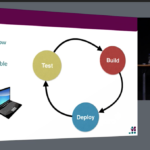Home Search
environment - search results
If you're not happy with the results, please do another search
Migrating to Linux: Network and System Settings
Learn how to transition to Linux in this tutorial series from our archives.
In this series, we provide an overview of fundamentals to help you successfully make...
Firejail – Securely Run Untrusted Applications in Linux
Sometimes you may want to use applications that have not been well tested in different environments, yet you must use them. In such cases,...
10 React Native Libraries Every React Native Developer Should Know About
If you are starting out a new app development project, chances are pretty high that you have already decided writing it with React Native....
Hybrid DevOps
DevOps is a framework that allows development, quality assurance, and operations to meet the needs of the business to align with customer demand. It...
DPDK — One API to Rule Them All?
The Data Plane Development Kit (DPDK) Summit 2018 was held at the Club Auto Sport in San Jose, California, last week, a unique and...
Strategies for Deploying Embedded Software
While many Embedded Linux Conference talks cover emerging technologies, some of the most useful are those that survey the embedded development tools and techniques...
Aliases: DIY Shell Commands
Aliases, in the context of the Linux shell, are commands you build yourself by packing them with combinations of other instructions that are too...
Get the Skills You Need to Monitor Systems and Services with Prometheus
Open source software isn’t just transforming technology infrastructure around the world, it is also creating profound opportunities for people with relevant skills. From Linux...
Demystifying Kubernetes Operators with the Operator SDK: Part 2
In the previous article, we started building the foundation for building a custom operator that can be applied to real-world use cases. In this part...
Linux For Beginners: Understanding The Many Versions Of Ubuntu
But did you know there are seven different "flavors" of Ubuntu?*
I'll briefly explain the kind of user each Ubuntu version is designed for, what differentiates them...






